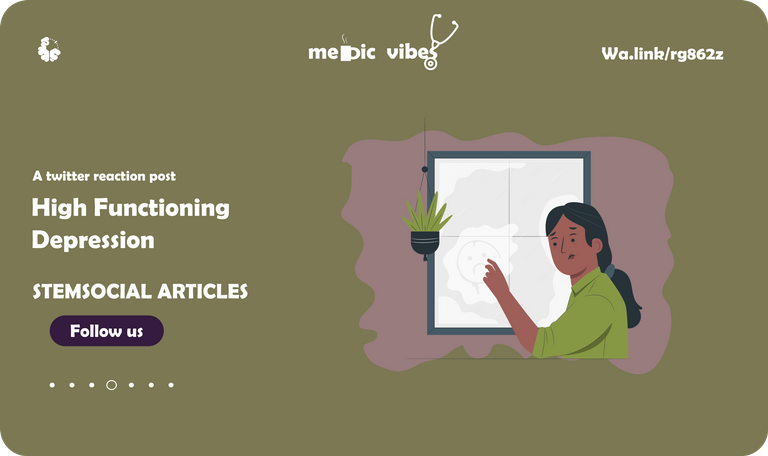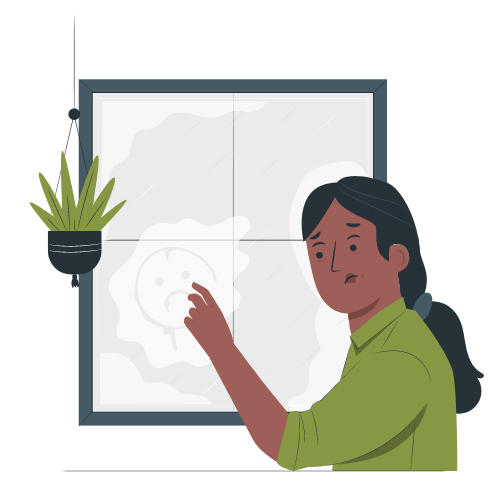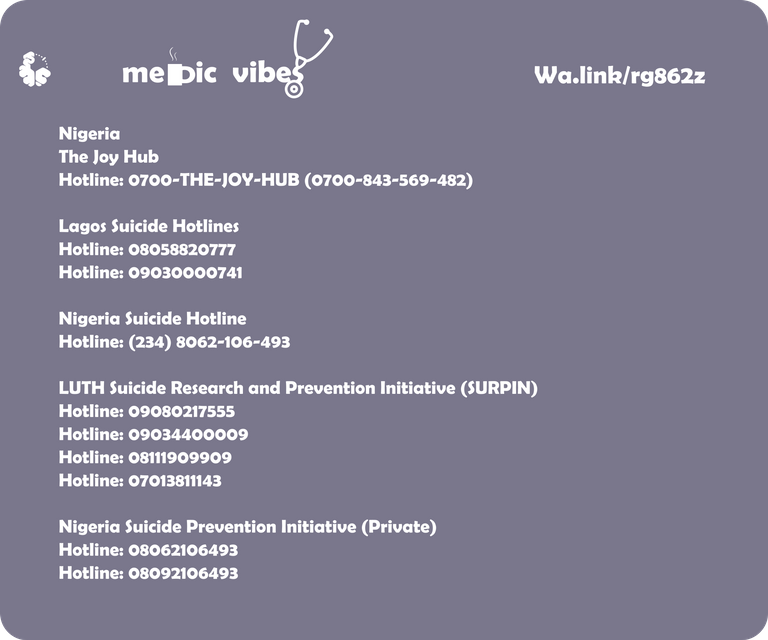High Functioning Depression (A twitter Response post)

Depression vector created by pch.vector - www.freepik.com and Inkscape.org
High functioning depression is tough to deal with. You literally are functioning completely fine but internally you’re falling apart and nobody can see it because you’ve managed to still function like a normal person😩
— Men’s Skincare Atlanta (@TheSkinChateau) August 6, 2022
In this post, we will be discussing High functioning depression. I hope to dig through and find out more about this post. With you with me on this expedition, there is nothing we cannot accomplish. I will be defining this type of depression and I will be finding out the specific features of the condition.
Before we go on, what do you think about High functioning depressed people, who do you think they are?
Hello, my name is Dr Ebingo Kigigha, I am a medical doctor and professional illustrator. I am the main writer here in Medic Vibes where we discussed depression and shone a light on some of the vague areas surrounding the topic. In the last post, I talked about Bottling emotions and if has an effect on depression. What I was able to find out was that speaking out can prevent depression but not in the clinical sense. I also made some recommendations about the topic and how more needs to be done to build up on the topic.
I found this touching video on Twitter, you can follow the link to the post or simply press play on Peakd.com
Look at the numbers of people that reached out to him, yet, depression and mental health remains an unchecked box in our society. pic.twitter.com/RezrOok7YI
— Omo Ure 🇳🇬 (@iam__temmyy) August 14, 2022
Depression is a medical health condition that affects almost everyone at some point and is characterised by a sad affect, a lack of pleasure in previously pleasurable activities. Other accompanying symptoms may be weight changes, changes in appetite, and suicidal ideation.
As already mentioned suicidal ideation is a symptom of depression and suicide is its fatal complication.
If you are dealing with these thoughts here are lines in Nigeria to call:
Check your country's suicide hotlines here.
High Functioning Depression

Mental health illustrations by Storyset
In my previous post about the types of, depression, we talked about the different types of depression. Among them are Major Depressive disorder, Seasonal depression, Persistent Depressive disorder and others. Check out that post here.
High functioning depression is otherwise known are Persistent Depressive Disorder PDD. PDD is defined by the symptoms of depression but the duration of normal depression diagnosis is 2 weeks, while for PDD the symptoms are not as intense but last for over 2 years.
One distinct feature I found that separates them is that lack of pleasure in previously pleasurable activities was not listed. I however feel that the symptom may be present but in low intensity.
Other symptoms of persistent depressive disorder are
- Changes in appetite
- Changes in weight
- Sleep changes
- Feelings of sadness
- Fatigue or tiredness
The symptoms are also accompanies by certain factors like
- Symptom-free period that does not last up to 2 months.
- There is no period of Euphoria, hypomania or mania.
- The symptoms can not be attributed to any other medical condition or use of substances.
It is important to note that those who experience PDD are at risk of Major Depressive Disorder and for that reason need to be handled with care.
It is estimated that about 1.5% of adults in America suffer from this condition with the prevalence being more in women than in men. 2.5% of people will experience PDD in their life time.
Just earlier today I was discussing with @alexanderalexis where we noted that it is more common to find more women dealing with depression than men... it's just an interesting note.
Tips
In order to deal with this condition properly a detailed history, physical examination and investigations need to be carried out to pinpoint that without a doubt the condition in question is in fact PDD.
Diagnosis will also help those who care about you to be able to help you appropriately and seek help for you.
Those who are diagnosed with PDD will benefit from antidepressants and therapy sessions. The therapy sessions will help break negative thought patterns that might be additional causes of depression.
Although the condition can be managed from outside the hospital without admission for better treatment, the patient will benefit from hospital admission.
Hive Stories
This post by @ultravioletmag. In this post, she describes events in her life that help her deal with depression.
With all the stigma surrounding this topic, I find it brave when a person decides to share their story with out fear of the consequences.
The title of the post is infact how to deal with depression. I hope you can find time to go through the post.
Question
- Was your initial impression the same as your final impression of High Functioning Depression?
- What would be your advice for someone dealing with this type of depression?
- What other types of depression are you aware of having read this post?

Yay! 🤗
Your content has been boosted with Ecency Points, by @starstrings01.
Use Ecency daily to boost your growth on platform!
Support Ecency
Vote for new Proposal
Delegate HP and earn more
@starstrings01 God bless you my bro
Congratulations @ebingo! You have completed the following achievement on the Hive blockchain and have been rewarded with new badge(s):
You can view your badges on your board and compare yourself to others in the Ranking
If you no longer want to receive notifications, reply to this comment with the word
STOPSupport the HiveBuzz project. Vote for our proposal!
Hello @ebingo,
An intriguing article, but I am afraid I will throw a bit of a fly in the ointment here. Whenever I see gender differences in medical outcomes/symptoms I stop and take a closer look. If self reporting is in any way involved, that makes the statistical gender gap suspect.
Here, for example is a 2021 article published in Frontiers in Psychiatry which challenges the gap.
An excerpt from that article:
The article is quite interesting and makes a lot of sense. It certainly questions the traditional view of depression rates in men and women.
Isn't it wonderful when one of your blogs gets a strong reaction? This is indeed a success. Thank you for writing this blog. I found it most interesting.
Yeah. Strong reactions means you paid attention. I'm glad you stopped by. I agree that self reporting is not the only reason for this phenomenon.
In the medical practice however I find it more common for women to show up to the hospital for conditions unrelated to depression and can give those complaints along with other complaints.
To me the article's conclusion clearly gives reasons why only sever cases of depression in men and mild and moderate cases in women are reported.
It gives these reasons as oestrogen levels, incidence peak, coping styles and differences in symptoms.
Its recomedations are to include male symptoms such as anger into the diagnostic criteria and raise more awareness.
I've experienced first hand the misunderstanding people can have to male depression. He is slightly violent and he pushes people away...this is typically the time when he might kill himself.
Yes that's the point I had raised with ebingo in his other article: that it's strange that women suffer from depression in about double the numbers as men do, but men, in all cultures, die by suicide 4 to 5 times more often. Either depression is not very much associated with suicide, or men just don't report their depression or, like ebingo proposed, their depression is atypical and/or not recognized as such, or underdiagnosed like the article you linked to says, or a number of other explanations of the same general kind.
My own feeling, based on my experience with males and females and coupled with everything I know from the literature, is that males actually suffer much more than women do, by and large (of course, what else would you expect from me!)
I agree with you. I think men do suffer more. Women are supported by associates. They open up and share the burden of their feelings. They seek company when they are upset. They express themselves. Men try to tough it. They equate stoicism with masculinity. Not a good thing.
Hope you are well, @alexanderalexis :)
Well that was unexpected :D
The reasons you give may be a large part of it. I sometimes wonder whether men, on average, are even capable of empathizing as much as women (though I also wonder about how genuine women's empathizing is). And things don't seem to be getting better: modern men seem to be suffering from a crisis in friendships, too, as I recently discovered from this podcast. I knew that relationships in general are suffering (less people are having sex now than earlier generations!), but was unaware about the male friendships thing.
Thanks for your contribution to the STEMsocial community. Feel free to join us on discord to get to know the rest of us!
Please consider delegating to the @stemsocial account (85% of the curation rewards are returned).
You may also include @stemsocial as a beneficiary of the rewards of this post to get a stronger support.